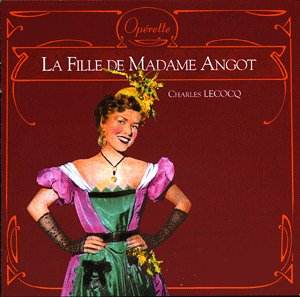This 2CD set forms one of a series of 20 operettas
re-released by Accord (Musidisc), France and available in the
UK from Discovery.
Charles Lecocq was a Parisian, born of
poor parents in 1832. He managed to get into the Conservatoire
in Paris where he studied under Auber. A contemporary of Bizet
and Saint-Saëns he went on to share with Bizet the grand
prize for Offenbach’s operetta writing competition in 1856. He
loved the creative potential of the theatre and became involved
with it for the rest of his life.
In Madame Angot, Lecocq skilfully
weaves delightful melodies of a variety of styles. The music,
like that of Varney, is characteristic of Offenbach, but his orchestrations
are more inventive. The music sweeps along with delightful melodies
and motifs: it is clear that Lecocq was a first class musician.
It is understandable that sheet music of Lecocq's Madame Angot
dance arrangements sold extraordinarily well.
The story is well known in France: a market girl
is adopted by a comfortable family and is brought up in a superior
manner. Lecocq’s libretto concentrates on the activities of Angot's
unexpectedly charming daughter, Clairette rather than Angot herself.
Set in the 1790s following the French Revolution and at the time
of the formidable French Directoire, the staging makes use of
the magnificent costumes of the period to provide a visual spectacle
(not dissimilar to the effect found in My Fair Lady).
Gabriel Bacquier has a fitting strength of voice
with considerable range and elegant falsetto for the part of Fitou.
He is well supported by Suzanne Lafaye in the Act II duet 'Voyons,
Monsieur' [CD1 tk.17]. I found Colette Riedinger somewhat shrill
and harsh in her role of Clairette and preferred some of her other
roles in this series of CD sets. Georgette Spanellys is effectively
forceful and gives a good portrayal as a chirpy Amarante with
good diction [CD1 tk.6].
In this performance only two pieces are omitted,
a comic duet in Act I and the ballet of Act III. Blareau handles
the orchestra beautifully, nicely regulating pace throughout,
particularly in the overture. I notice that he knocks a minute
off the usual five minute overture yet it does not sound rushed
(and I cannot detect that the piece was abridged). The pace is
generally quicker than that of the other available recording (EMI),
but rarely does one consider it disagreeable. Only a particularly
rushed Act I opening introduction and chorus is disappointing:
here the chorus is rather recessed and the music taken too quickly
for clarity of notes or clear annunciation of words.
The dry acoustics may not be perfect, yet the
characters play their roles with conviction. Towards the end of
CD tk.3 (3'10" in) a patch of 'ripple' was detected on the woodwind
passages and seemed to indicate a crease in the master tape. There
are no other transfer problems.
Brief notes in French are provided in the attractive
card case.
Raymond Walker
Other sets in the Accord 'Operette'
series:
Audran, La Mascotte [465 877-2];
Benatzky, L'Auberge du Cheval Blanc
[465 880-2];
Christiné, Dédé
[461 961-2] Phi-Phi [465
886-2];
Dumas, Ignace [472 877-2];
Ganne, Les Saltimbanques [465
868-2];
Goulblier, La Cocarde de Mimi Pinson
[461 964-2];
Lecocq, La Fille de Madame Angot
[465 883-2] Le Petit Duc [472
874-2]; Lehár, Paganini [472
868-2] Rose de Noel [472 871-2];
Maillart, Les Dragons de Villars
[472 865-2];
Messager, Véronique [465
864-2];
Offenbach, La Belle Hélène
[461 954-2] La Fille du Tambour Major
[461 673-2] La Grande Duchesse de
Gérolstein [465 871-2];
Planquette, Les Cloches de Corneville
[465 861-2];
J Strauss, Trois Valses [461
958-2];
Yvain, La-Haut [461 967-2].
Operette
series from Universal Accord reviewed
by Ray Walker
Further reading: "Operetta",
Traubner (Oxford 2003); ‘Musicals",
Ganzl (Carlton 1995)
